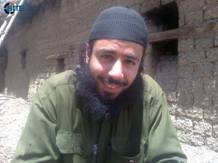 |
|
Abu Abdul Rahman al Aseer al Urduni. Image from the SITE Intelligence Group. |
A Jordanian jihadist was killed while battling Coalition and Afghan forces in the eastern Afghan province of Ghazni, a known stronghold of al Qaeda.
A brief statement on the death of Abu Abdul Rahman al Aseer al Urduni was released on the al Qaeda-linked Ansar al Mujahideen Internet forum on July 12. The statement, titled “Martyrdom of a Member of the Ansar al-Mujahideen Network on the Soil of Khorasan,” was translated by the SITE Intelligence Group. The exact date of al Urduni’s death was not disclosed.
“We send you the news of the martyrdom of one of the lions of Allah, as we consider him and Allah knows him best, the mujahid brother Abu Abdul Rahman al Aseer al Urduni,” the statement said.
“He was killed in Ghazni province while attacking head on and not running away,” the statement continued.
Prior to his death, al Urdani had “used the nickname ‘Abu Musab al-Hurani’ on the Ansar al Mujahideen and Shumukh al Islam forums, and in postings in 2011, had reported the deaths of fellow Jordanian fighters in the Afghan-Pakistan region,” the SITE Intelligence Group stated.
In a follow-up statement, which was released on July 23 by Abu Zubayda al Lubnani, a known Lebanese jihadist, it was disclosed that al Urdani was killed in early July after US forces conducted an operation in Ghalbit in Ghazni.
Al Lubnani said that Urdani “was imprisoned in Jordan for five years, during which he suffered extreme torture and harassment,” according to the SITE Intelligence Group. “He told me that he went to Iraq and returned, and he used to work as a coordinator to send brothers to Sheikh Abu Musab al-Zarqawi in the time of Tawhid and Jihad. He sent more than 30 brothers to Iraq.”
Urdani entered Pakistan in 2010 and fought the Pakistani Army in the Arakzai tribal agency. He entered Afghanistan in 2012 and was killed two months later.
Jordanian foreign fighters killed in Afghanistan
Several Jordanians have been killed while waging jiahd against NATO and Afghan forces in Afghanistan. The most infamous, Abu Dujanah al Khurasani, a longtime Internet jihadi whose real name is Humam Khalil Muhammed Abu Mulal al Balawi, carried out the Dec. 30, 2009 suicide attack at Combat Outpost Chapman in Khost province that killed seven CIA officials and contractors, and a Jordanian intelligence officer. Khurasani was recruited by Jordanian intelligence to provide targeting information for the US’s covert air campaign against al Qaeda’s leaders and operations in the tribal areas of Pakistan. Khurasani had enticed the CIA with promises of being able to produce Ayman al Zawahiri, al Qaeda’s second in command, and then detonated a suicide vest once he was granted access to the base.
Mahmoud Hamdan Nizal, a Jordanian who was known as Abu Dher al Urduni, was killed while fighting US troops in the Bermel district in the eastern Afghan province of Paktia. The date of Nizal’s death was not disclosed. His death was announced in June 2011.
Abu al Zubeir al Jabri, another Jordanian fighter, who was also known as Saber Muhammad Saber, was killed in an undisclosed location while attacking a “Crusader base” on July 15, 2011.
Also, the brother of a prominent Jordanian cleric is reported to have entered Afghanistan sometime in the first half of 2011. Salahuddin al Maqdisi, the brother of radical Jordanian Islamist cleric Abu Mohammed al Maqdisi and a former aide to slain al Qaeda in Iraq leader Abu Musab al Zarqawi, is currently in Afghanistan, according to a statement released on a jihadist website in June 20011.
Al Qaeda activity in Ghazni province
Al Qaeda and allied terror groups maintain a strong presence in Ghazni province. The presence of al Qaeda and Islamic Movement of Uzbekistan cells has been detected in the districts of Andar, Gelan, Ghazni, Shah Joy, and Waghaz, or five of the province’s 16 districts, according to an investigation by The Long War Journal.
Osama bin Laden mentioned that Ghazni province is a fallback position for al Qaeda operatives seeking to escape the US drone strikes in North and South Waziristan, according to one of the documents seized from his compound in Abbottabad, Pakistan and released to the public.
US forces are known to have captured seven al Qaeda operatives in Ghazni since 2008. The most prominent al Qaeda operative captured in Ghazni is Aafia Siddiqui, an American-educated Pakistani scientist who has been dubbed “Lady al Qaeda” by the press. Siddiqui was detained in Ghazni City on July 17, 2008, and attempted to kill US military officers and FBI agents during her interrogation the next day. According to US prosecutors, Siddiqui had “various documents, various chemicals, and a computer thumb drive, among other things” in her possession when she was arrested. Handwritten notes she was carrying referred to a “mass casualty attack” and listed “various locations in the United States, including Plum Island, the Empire State Building, the Statue of Liberty, Wall Street, and the Brooklyn Bridge.” She is currently serving an 86-year-long prison sentence for attempting to kill US officials.
Another al Qaeda operative was captured in Ghazni City during a special operations raid on Nov. 18, 2009. An unnamed “al Qaeda IED facilitator” who served in al Qaeda’s Shadow Army, or Lashkar al Zil, was among several terrorists detained during the raid.
And in June 2011, special operations forces captured five al Qaeda operatives during a raid in the Gelan district that targeted a “senior al Qaeda facilitator” who operates from Pakistan and supports attacks in Afghanistan. “The facilitator, who typically operates in Pakistan, helps plan terrorist operations and moves fighters, money and materials into Afghanistan and Pakistan,” ISAF said in a press release.
For more information on al Qaeda’s presence in Ghazni, see LWJ report, ISAF targets al Qaeda-linked Taliban operative in Afghan southeast.







